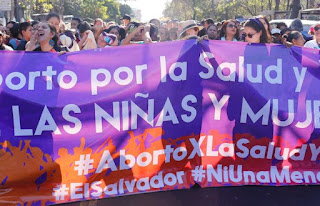El Salvador's harsh anti-abortion regime
Abortion is a crime in El Salvador, with no exceptions – even in cases of rape or incest, where the pregnancy endangers the pregnant woman’s life or health, or in cases of severe fetal impairment. Anyone who has an abortion, and the medical providers who perform or induce them, can face drastic prison sentences. Women have been convicted of murder after being accused of having had an abortion, sometimes with prison terms for up to 40 years. For some of these women, having a miscarriage or stillbirth was used as evidence to convict them.
A woman in El Salvador has been sentenced to 50 years in prison for aggravated homicide in a controversial case in which authorities argued she had killed her baby after giving birth, while her defenders said she had suffered a miscarriage.
From an article by the BBC titled Abortion laws: The women jailed for suffering miscarriages
It is not possible to verify that all the imprisonment cases were [miscarriages], but campaigners say that the current legislation results in the prosecution of women who did not seek abortions.
Women's rights organisations in El Salvador add that the issue disproportionally affects women who do not have the economic resources for private healthcare....
"Poor women in El Salvador are the ones who suffer the most with legislation which stigmatises them and also drives many to clandestine abortions," Morena Herrera, a well-known Salvadorian pro-choice activist, explains. "We need to free those imprisoned women, but we also need to put an end to their persecution."
El Salvador's strict anti-abortion law arises from a conservative religious climate rooted in the Catholic church, but also in the increasingly influential conservative evangelical churches in the country. The BBC described the power of the evangelical church sector:
As its reach grows, so too does its political clout, with evangelical values and views increasingly present inside parliament.
Guillermo Gallegos, one of the vice presidents of the national assembly, is staunchly anti-abortion.
He insists decriminalisation would never pass the first legislative hurdle, "even where the mother's life is at risk".
"In any case where that little creature still has life," he tells me, "then I lean towards saving it over saving the mother".
President Nayib Bukele wrote last year that he would oppose any legal reforms to abortion laws indicating:
I have decided, to dispel ANY DOUBT, NOT TO PROPOSE ANY KIND OF REFORM TO ANY ITEMS RELATED TO the RIGHT TO LIFE (from the moment of conception)
The comment came in response to language in a proposed new constitution developed by a working group headed by his vice president Felix Ulloa.
In October 2021, a commission of the Legislative Assembly rejected without significant discussion a proposal to decriminalize abortion in situations of a risk to the life of the mother, an unviable fetus, or in the case of rape.
El Salvador's strict prohibition on abortion goes into the opposite direction of a growing trend in Latin America to liberalize abortion laws. Three of the four most populous countries in Latin America -- Argentina, Mexico and Colombia -- have decriminalized abortion in the past two years. Chile may do so later this year.
*Photo credt: ARPAS

Comments